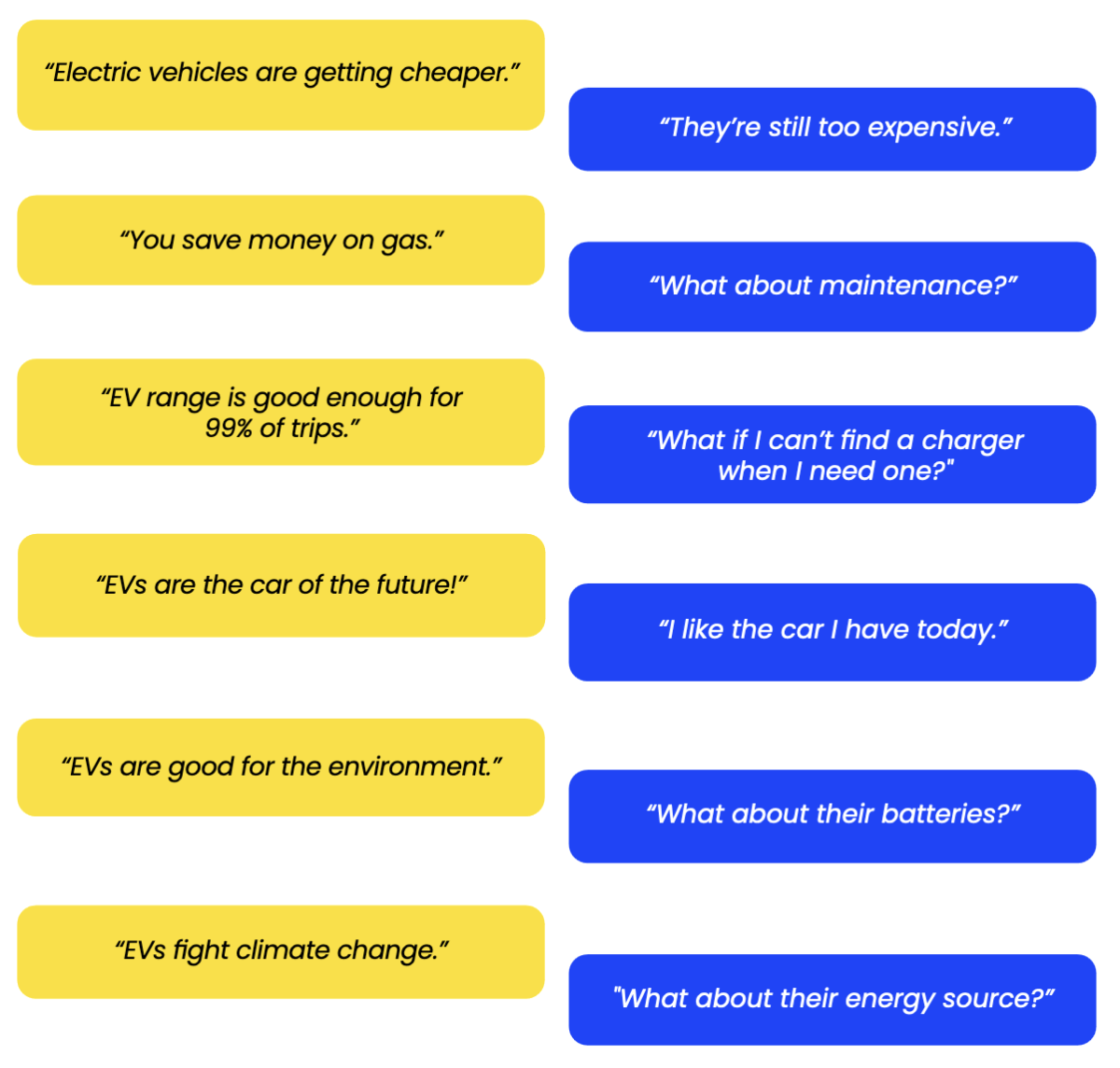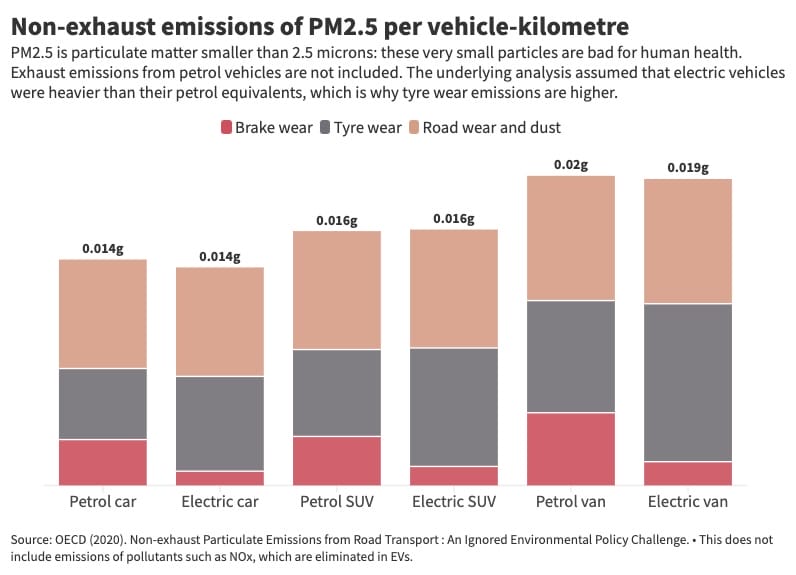Electric vehicle uptake is occurring at very different rates in different parts of the world. Some countries have incentive policies, and some don’t.
Alongside this are ideologies and misperceptions that make the market difficult to predict.
What are the barriers, and how might certain EV narratives turn people off?
Early in 2024, the US-based Potential Energy Coalition [1] undertook a series of research projects. The research was focused on public response to potential EV programs. The goal was to discover what messages about EVs (and possible incentives) lead to the ‘least objections’ from people across the political spectrum.
The results are insightful, helping reframe how government policy could be presented.
Quick Summary
Positive aspects of electric vehicles, as seen by supporters, often face negative reactions.
Framing conversations about EVs in terms that people agree on is helpful.
Specifically: Toxic fumes aren’t good. EVs can reduce those pollution health risks to our families. Let’s make them affordable for all (but don’t force anyone to choose).
The research highlighted the level of misperceptions that abound:
Just 50% of survey respondents agreed that EVs reduce pollution from the transport sector.
Despite objective research showing that switching from combustion vehicles to electric lowers air pollution [2] [3] [4] [5]; these beliefs are strong and persistent.
In the face of a narrative of disinformation, many of the ‘selling points’ of an EV are dismissed out of hand.
They are conversational roadblocks. What one person sees as a selling point is countered by another’s argument.

What messages do resonate with people?
Reduced air pollution [7]
Example:
“Air pollution released by tailpipes makes it hard to breathe and can damage our health. EVs are pollution-free*, helping to reduce toxic fumes, clean up our air, and improve our quality of life.”
Most impactful statement: “Dirty smog makes it unpleasant to breathe, and it can even lead to damaging health effects.”
*See references below regarding ‘pollution-free’.
Increased affordability
Example:
“People should have the ability to afford electric. We should invest and make them cheaper for everyday people.”
Something stood out in this narrative.
People DON’T like being told what car they should drive. 90% agreed that “People should have the right to choose the car they want to drive.”
People agree EVs should be more affordable. That everyone should have an opportunity to buy, but just don’t tell anyone what they should be buying.
What public messaging didn’t help?
❌ Combustion car bans and mandates: instant opposition. Don’t allow anyone to think they’re forced to buy something they don’t want. Or their right to purchase their desired car is being taken away.
❌ EVs give us energy independence: this is conceptual. Instead: “clean cars improve our health and give us clean air” (our family’s health is a priority).
❌ Get an EV to fight rising petrol prices: people are suspicious about the cost of battery replacement and rising ownership costs.
❌ EVs are superior and accelerate quickly: people prefer their own car, and believe that combustion cars perform better than electric.
“no matter how many stats they hear on speeds from zero-to-sixty, people still believe gas cars perform better than electric.”
– The Road to Clean [6]
What’s the best message about EVs?
Everyone, everywhere should have the choice to make their next car a clean car.
This message hits 3 positives:
- Clean (cuts toxic fumes polluting our communities and overheating our planet)
- Affordable (not just for elites, it’s for everyone who wants one).
- Practical (convenient, accessible, and easy to charge).
It turns out that most people agree that pollution is bad and we should reduce it. But words like ‘carbon emissions’ can be politically charged. Words like ‘toxic fumes’ or ‘tailpipe pollution’ resonate.
✅ Sell progress, not perfection: Going all-in on electric is scary to a lot of people. But steady progress on reducing pollution, better charging infrastructure, and more affordable cars sound much better.
✅ Make it personal, practical, and affordable: “I get more choice and a future with less pollution”.
The benefits of EVs: the three C’s
What are the things that matter to people about going electric?
- Cost
Cost less to operate. - Comfort
More comfortable and safer. - Convenience
More convenient.
How best to talk about EV ownership:
- Tell stories of your experience with your EV (make it personal).
- EV myths? Use this format: “I had heard X, but have found Y, and I’m benefiting from Z“
Example (convenience):
- “I’d heard you spend ages waiting for charging, but I found I just charge at home every night. I plug it in and walk away.”
Many people do not realise that most EV charging happens (conveniently) at home. But are instead worried about that one time they need to drive across the motu and need to charge somewhere.
Example (cost):
- “I heard it costs a lot to charge. But I ended up changing power providers and charging at night on really cheap rates. I also ended shifting our hot water heating – and our bill is actually lower.”
Note: Is there a fourth C missing (climate)? It’s probable that those motivated by climate concerns are already well on the EV journey (and debating climate claims can often be fruitless).
Given that there is sometimes pushback on ‘saving the planet’: Instead of “do this to save the planet!”, use “do this to save yourself!” (the planet will go on, even if the human species destroys itself).
References
[1] Potential Energy Coalition, Inc. is a 501(c)(3) charitable, nonpartisan organization for public education purposes only.
[3] https://www.carboncounter.com/
[4] https://www.nature.com/articles/s41893-020-0488-7
[5] https://www.carsco2comparator.eu
[6] PDF
[7] Urban pollution dropping 2.6 ± 0.7%/year in San Francisco Bay area (due to vehicle electrification).
Asimow, N. G., Turner, A. J., & Cohen, R. C. (2024). Sustained Reductions of Bay Area CO2 Emissions 2018–2022. Environmental Science & Technology.
[8] EV messaging war (Michigan).
* Pollution free
No vehicle is pollution-free. While EVs have no tailpipe emissions, there is particulate emission. In simple terms, EVs emit more tyre wear particulate than same-sized combustion (due to the increased weight of same-size vehicles). But decreased brake wear.
See the deep dive into this at sustainabilitybynumbers


